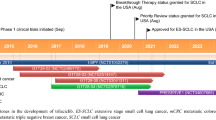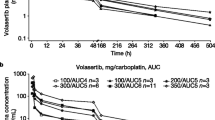Conclusion
VP16-213 is a new semisynthetic podophyllotoxin derivative, which appears to have a unique mode of action. Early suggestive data of activity in small cell lung cancer [21, 25] have ben confirmed and the single-agent response rate remains at over 40% with well more than 200 patients studied. It also shows a pronounced antitumor activity in the treatment of testicular cancer, monocytic or myelomonocytic leukemia, non-Hodgkin's lymphomas and hepatocellular carcinoma. Its role in some other neoplasms, like non-small cell lung cancer and breast cancer, has still to be ascertained.
New data on its pharmacokinetic properties are being rapidly accumulated. Based on this knowledge a more optimal schedule of administration can be expected. New modes of administration, which like, e.g., continuous infusions in the past were only occasionally used [6, 36], are presently being thoroughly investigated. One might therefore reasonably hope, that in the next few years all potentialities of the drug will be more exactly defined.
Retropectively the phase-I-II trials with VP16-213 might be viewed as an example of the methodological difficulties encountered in the clinical evaluation of new agents. Some pitfalls can probably be avoided by implementing a more stringent and standardized methodology. Other difficulties seem on the contrary to represent inherent drawbacks of our current approach. Hopefully the “stem cell clonogenic assay” will in future turn out to be a useful tool for the solution of some of these remaining problems [34].
Similar content being viewed by others
References
Arnold AM (1979) Podophyllotoxin Derivative VP16-213. Cancer Chemother Pharmacol 3: 71
Beveridge T, Kalberer F, Nuesch E (1976) Bioavailability study with H-VP16-213 in man (Internal report). Sandoz, Basle
Brunner KW, Sonntag RW, Ryssel HJ, Cavalli F (1976) Comparison of the biologic activity of VP16-213 given IV and orally in capsules or drink ampoules. Cancer Treat Rep 60: 1377
Cavalli F (1980) Die Entwicklung neuer Substanzen in der Onkologie. Viele Probleme und einige Lösungen. Dtsch Med Wochenschr 105: 909
Cavalli F (1981) New drugs in the treatment of gastric cancer: Methodological problems and some data. In: Friedman M, Ogawa M, Kisner D (eds) Diagnosis and treatment of upper gastrointestinal tumors. Excerpta Medica, Elsevier North-Holland, p 412
Cavalli F, Ryssel H, Batz K, Sonntag RW, Brunner KW (1975) Erste Resultate mit dem Epipodophyllotoxin-Derivat VP16-213 bei der Behandlung akuter Leukämien. Schweiz Med Wochenschr 105: 250
Cavalli F, Sonntag RW, Tschopp L, Ryssel H, Brunner KW (1977) Therapieresultate mit VP16-213 allein oder kombiniert mit Fluorouracil beim Leberzellkarzinom. Schweiz Med Wochenschr 107: 1960
Cavalli F, Sonntag RW, Jungi F, Senn HJ, Brunner KW (1978) VP16-213 monotherapy for remission induction of small cell lung cancer: a randomized trial using three dosage schedules. Cancer Treat Rep 62: 473
Cavalli F, Jungi WF, Brunner KW (1981) Randomisierte Phase-II-Studie mit VP16-213 (Etoposide) in der Behandlung vom fortgeschrittenen Mammakarzinom. Onkologie 4: 80
Cavalli F, Klepp O, Renard J, Röhrt M, Alberto P (1981) A phase-II study of oral VP16-213 in non-seminomatous testicular cancer. Eur J Cancer 17: 245
Cavalli F, Rozencweig M, Goldhirsch A, Renard J, Hansen HH (1981) Phase-II trial with oral VP16-213 in hepatocellular carcinoma. Eur J Cancer 17: 1079
Creavan PJ, Newman SJ, Selawry OS, Cohen MH, Primack A (1974) Phase-I clinical trial of weekly administration of 4′-demethylepipodophyllotoxin 9-(4,6-0-ethylidene-β-D-glucopyranoside) NSC 141540: VP16-213. Cancer Chemother Rep 58: 901
D'Incalci M, Farina P, Sessa C, Mangioni C, Conter U, Masera G, Rocchetti M, Brambila Pisoni M, Piazza E, Beer M, Cavalli F (1982) Pharmacokinetics of VP16 given by different administration methods. Cancer Chemother Pharmacol 7: 141–145
Dombernowsky P, Nissen NI (1973) Schedule dependency of the anti-leukaemic activity of the podophyllotoxin derivative VP16-213 (NSC 141540) in L 1210 leukaemia. Acta Pathol Microbiol Scand (A) 81: 715
Eagan RT, Ahmann DL, Hahn RG, O'Connell MJ (1975) Pilot study to determine an intermittent dose schedule for VP16-213. Proc AACR 16: 55
Eagan RT, Carr DT, Frytak S, Rubin J, Lee RE (1976) VP16-213 versus polychemotherapy in patients with advanced small cell lung cancer. Cancer Treat Rep 60: 949
Eagan RT, Ingle JN, Creagan ET, Frytak S, Kvois LK, Rubin J, McMahon RT (1978) VP16-213 chemotherapy for advanced squamous cell carcinoma and adenocarcinoma of the lung. Cancer Treat Rep 62: 843
EORTC Clinical Screening Group (1973) Epipodophyllotoxin VP16-213 in treatment of acute leukaemias, haematosarcomas, and solid tumours. Br Med J 3: 199
Falkson G, Van Dyk JJ, Van Eden EB, Van der Merwe AM, Van der Bergh JA, Falkson HC (1975) A clinical trial of the oral form of 4′-demethylepipodophyllotoxin-β-D-ethydine glucoside (NSC 141540) VP16-213. Cancer 35: 1141
Fitzharris BM, Kaye SB, Saverymuttu S, Newlands ES, Barrett A, Peekham MJ, McElwain TJ (1980) VP16-213 as a single agent in advanced testicular tumours. Eur J Cancer 16: 1193
Hansen M, Hirsch F, Dombernowsky P, Hansen HH (1977) Treatment of small cell anaplastic carcinoma of the lung with the oral solution of VP16-213 (NSC 141540) 4′-demethylepipodopohyllotoxin 9-(4,6-0-ethylidene-β-D-glucopyranoside). Cancer 40: 633
Harper PG, Dally MB, Geddes DM, Spiro SG, Smyth JF, Souhami RL (1982) Epipodophyllotoxin (VP16-213) in small cell carcinoma of the bronchus resistant to initial combined chemotherapy. Cancer Chemother Pharmacol 7: 179–180
Itri LM, Gralla RJ, Kelsen DP, Chapman RA, Golbey RB, Kaufman RJ, Young CW (1981) VP16-213: A phase-II study of non-small cell lung cancer. Proc AACR 22: 199
Issell BF, Crooke ST (1979) Etoposide (VP16-213). Cancer Treat Rev 6: 107
Jungi WF, Senn HJ (1975) Clinical study of the new podophyllotoxin derivative 4′-demethylepipodophyllotoxin 9-(4,6-0-ethylidene-β-D-glucopyranoside) (NSC 141540: VP16-213) in solid tumours in man. Cancer Chemother Rep 59: 737
Lau ME, Hansen HH, Nissen NI, Pedersen H (1979) Phase-I trial of a new form of an oral administration of VP16-213. Cancer Treat Rep 63: 485
Lee YJ, Catane R, Rozencweig M, Bono UH, Muggia FM, Simon R, Staquet MJ (1979) Analysis and interpretation of response rates for anti-cancer drugs. Cancer Treat Rep 63: 1713
Muggia FM, McGuire WP, Rozencweig M (1979) Rationale, design and methodology of phase II clinical trials. Methods Cancer Res 17: 199
Nissen NI, Larsen V, Pedersen H, Thomsen K (1972) Phase I clinical trial of a new antitumour agent: 4′-Demethylepipodophyllotoxin 9-(4,6-0-ethylidene-β-D-glucopyranoside), NSC 141540: VP16-213. Cancer Chemother Rep 56: 769
Nissen NI, Dombernowsky P, Hansen HH, Larsen V (1976) Phase-I clinical trial of an oral solution of VP16-213. Cancer Treat Rep 60: 943
Nissen NI, Pajak TF, Leone LA, Bloomfield CD, Kennedy BJ, Ellison RR, Silver RT, Weiss RB, Cuhner J, Falkson G, Kung F, Bergevin P, Holland JF (1980) Clinical trial of VP16-213 (NSC 141540) i.v. twice weekly in advanced neoplastic disease. A study by the cancer and leukemia group B. Cancer 45: 232
Radice PA, Bunn PA Jr, Ihde DC (1979) Therapeutic trials with VP16-213 and VM26: Active agents in small cell lung cancer, non-Hodgkin's lymphoma and other malignancies. Cancer Treat Rep 63: 1231
Rozencweig M, Von Hoff DD, Henney JE, Muggia FM (1977) VM26 and VP16-213: A comparative analysis. Cancer 40: 333
Salmon SE, Hamburger AW, Soehulen BD (1978) Quantitation of differential sensitivities of human tumor stem cells to antitumor drugs. N Engl J Med 298: 1321
Schell FC, Yap HY, Hortobagy GN, Buzdar AU, Blumenschein GR, Issell B, Esparza L (1981) Phase II study of VP16-213 (Etoposide) in refractory metastatic breast carcinoma. Proc ASCO 22: 357
Smith IE, Clink H, Gerken ME, McElwain TJ (1976) VP16-213 in acute myelogenous leukaemia. Postgrad Med J 52: 66
Staquet MJ, Rozencweig M, von Hoff DD, Muggia FM (1979) The delta and epsilon errors in the assessment of cancer clinical trials. Cancer Treat Rep 63: 1917
Vaitkevicius VK, Reed ML (1966) Clinical studies with podophyllum compounds SPI-77 (NSC-72274) and SPG-827 (NSC-42076). Cancer Chemother Rep 50: 565
Author information
Authors and Affiliations
Rights and permissions
About this article
Cite this article
Cavalli, F. VP16-213 (Etoposide). Cancer Chemother. Pharmacol. 7, 81–85 (1982). https://doi.org/10.1007/BF00254526
Accepted:
Issue Date:
DOI: https://doi.org/10.1007/BF00254526




